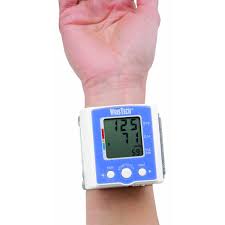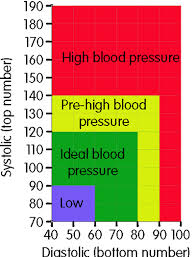Health News:
6 Signs Of High
Blood Pressure


High blood pressure is a common health issue that puts your life under many health risks. People may suffer from high blood pressure for years without showing any signs of it. Blood pressure is the force applied on the arterial walls during blood flow. So, when a person is said to have high blood pressure, it means that the arterial walls are receiving too much of pressure repeatedly due to the pumping of blood by the heart.
High blood pressure is a common health issue that puts your life under many health risks. People may suffer from high blood pressure for years without showing any signs of it. Blood pressure is the force applied on the arterial walls during blood flow. So, when a person is said to have high blood pressure, it means that the arterial walls are receiving too much of pressure repeatedly due to the pumping of blood by the heart.
The
normal blood pressure is 120/80mmHg. You can be diagnosed for high blood pressure
when it is above 140/90mmHg. But, this may vary depending on the age and
physiological conditions. Blood pressure should be monitored on a regular basis
for any adult above the age of 30.
There
are also various factors that affect blood pressure. Those conditions are age,
family history, obesity, physical activity, smoking and alcohol intake. If the
condition is left untreated for a long period, it can lead to various other
serious problems such as kidney failure, heart problems and stroke.
If you are at a risk of hypertension or high
blood pressure, it is important to keep in mind the signs of high blood
pressure. This will help you in seeking medical assistance at the earliest.
Headache
When you have blood pressure above
180/110mmHg, headache can be a prominent symptom. But, headaches are not
generally found in case of mild increase in the blood pressure. Headaches are
commonly associated with malignant hypertension, a more serious condition.
Nose Bleeding
Bleeding from the nose is a sign of high blood
pressure only during the initial stage. If you have high blood pressure and
experience a sudden onset of nose bleeding that is heavy or hard to stop, it is
better to consult your doctor and get your blood pressure checked.
Blood Spots In The Eye
There
are chances that blood spots or subconjunctival hemorrhages could be signs of
high blood pressure or diabetes. This can be cleared out by an ophthalmologist
after checking for any defect in the optical nerve. If not related to the eye,
blood pressure needs to be ruled out.
Numbness in the extremities
Numbness
or tingling in the extremities can be an early sign of a stroke due to
increased blood pressure. Constant uncontrolled hypertension will result in
nerve damages, which is the major reason for this symptom.
Nausea and Vomiting
Another
sign of high blood pressure is vomiting and nausea. Since vomiting is related
to many other reasons, it is better to look for other associated symptoms such
as blurred vision or shortness of breath along with it.
Dizziness
Dizziness presents two symptoms, lightheadedness
and vertigo. This should not be ignored, especially when seen suddenly.
Faintness, along with loss of balance and trouble in walking can be signs of
stroke.

No comments:
Post a Comment